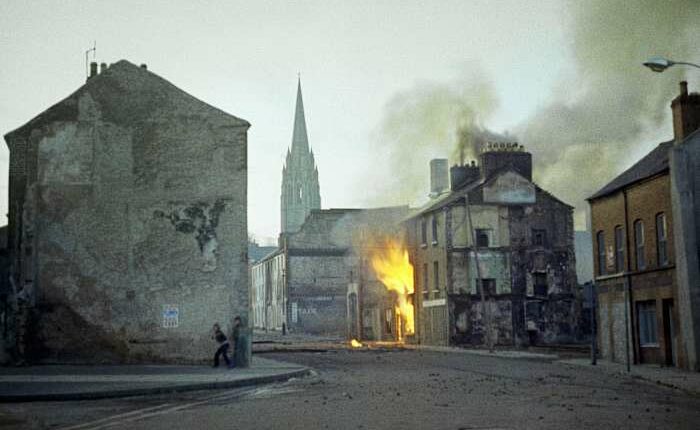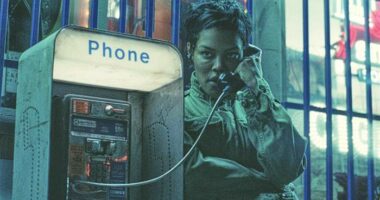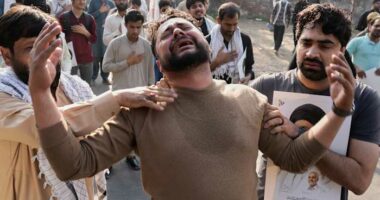Share this @internewscast.com

LONDON – For 50 years, families of those killed and wounded during the 1972 Bloody Sunday event, where British troops shot and killed 13 unarmed civil rights protesters and hurt 15 others in Northern Ireland, have pursued justice with no one ever being held legally responsible.
This situation might change soon, as a former British soldier is set to face trial on murder charges for the deaths of two individuals and attempted murder of five others.
The ex-paratrooper, known only as “Soldier F,” remains hidden from public view during the trial, sheltered by a large blue curtain for his protection from possible retaliation. He stands alone as the defendant in the most lethal attack during three decades of turmoil in Northern Ireland, often referred to as “The Troubles.”
The tragic events on January 30, 1972, in Londonderry have become emblematic of the conflict between mainly Catholic proponents of Irish unity and primarily Protestant groups preferring to stay within the UK. The peace process following the 1998 Good Friday Agreement has since eased these tensions by allowing power-sharing between Republican and Unionist parties in Northern Ireland.
The path to the nonjury trial in Belfast Crown Court has been a torturous journey for families of the victims.
From instigators to victims
Initially, the government claimed that soldiers from a parachute regiment had fired upon attackers wielding guns and bombs. An early inquiry absolved the troops. However, a later, extensive investigation in 2010 determined that the soldiers had shot at unarmed individuals fleeing the scene and maintained falsehoods for years afterward.
Then-Prime Minister David Cameron apologized and said the killings were “unjustified and unjustifiable.”
The findings cleared the way for the eventual prosecution of Soldier F, though that, too, has been beset by delays and obstacles.
It took seven years after law enforcement started investigating before prosecutors decided in 2019 to charge only Soldier F. They concluded there was insufficient evidence to prosecute 16 other former soldiers and two supposed members of the Official Irish Republican Army concerning their involvement in the shootings.
Two years later, the Public Prosecution Service dropped the case because they didn’t think they could prevail at trial. They made the decision after a judge tossed out a case against two soldiers in the killing of an Irish Republican Army leader after ruling key prosecution evidence was inadmissible.
But family members of one the Bloody Sunday victims appealed and the case against Soldier F was reinstated.
Long wait for justice
Tony Doherty, whose father Patrick was one of those killed, said the campaign for justice that began in 1992 had three demands: a declaration of innocence for the dead and wounded, rejection of the initial inquiry’s conclusions and prosecution of those responsible.
“The first two demands have been met, and when a British soldier stands in the dock on Monday and faces charges of multiple murder and attempted murder, we will see the third demand met, although we will always believe there should be many more on trial for Bloody Sunday,″ Doherty said. “We have waited 53 long years for justice and, hopefully, we will see a measure of it through this trial.”
Soldier F has pleaded not guilty to two counts of murder in the deaths of James Wray and William McKinney, and five attempted murders for the shootings of Joseph Friel, Michael Quinn, Joe Mahon, Patrick O’Donnell and a person whose identity is unknown.
A quarter century after the peace agreement, Bloody Sunday remains a source of tension in Northern Ireland.
Families of the victims continue to demand justice for their loved ones, while supporters of army veterans who fought in the conflict complain that they continue to be dogged by investigations and potential charges decades after their service ended.
Britain’s Ministry of Defense had said it would defend the ex-soldier while also working to reform the system for investigating allegations of past military misdeeds.
Derry Councilor Shaun Harkin, of the People Before Profit party, said the case against Soldier F represents the British state going on trial.
“The British government has sought to protect its parachute regiment killers for decades through lies, cover-up, delay and evasion,” Harkin said. “Soldier F pulled the trigger on Bloody Sunday and should be held to account, but the British government and top military brass who gave the orders should be held to account too.”
Copyright 2025 The Associated Press. All rights reserved. This material may not be published, broadcast, rewritten or redistributed without permission.










